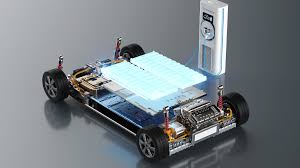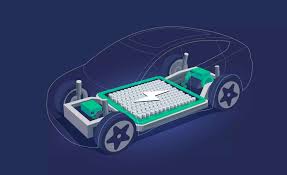Electric vehicles (EVs) are rapidly transforming the automotive industry, and at the heart of this revolution is EV battery technology. As the primary energy source for electric cars, the performance, efficiency, and innovation surrounding EV battery technology are crucial for the advancement and adoption of electric vehicles. This paragraph delves into the current state and future prospects of EV battery technology, highlighting key developments and their implications for the automotive sector.

EV battery technology has seen significant advancements over the past decade, driven by the increasing demand for cleaner and more efficient transportation solutions. One of the most notable breakthroughs in EV battery technology is the improvement in energy density. Modern lithium-ion batteries, which are the most common type used in electric vehicles, have seen substantial gains in energy density, meaning they can store more energy in the same amount of space. This translates to longer driving ranges, addressing one of the primary concerns of potential EV buyers: range anxiety. Advances in lithium iron phosphate (LiFePO4) and solid-state batteries are also pushing the boundaries of energy density, offering the promise of even greater performance in the near future.
Another critical aspect of EV battery technology is charging speed. Traditionally, the time required to charge an electric vehicle has been a significant drawback compared to the quick refueling of gasoline-powered cars. However, recent innovations in fast-charging technology are changing this narrative. High-power charging stations and improved battery management systems are reducing charging times, making it more convenient for users to charge their vehicles. For instance, ultra-fast chargers can now deliver up to 350 kW of power, enabling a 10-80% charge in as little as 20 minutes. This progress in EV battery technology is crucial for enhancing the practicality and attractiveness of electric vehicles for everyday use.
Battery life and longevity are also essential components of EV battery technology. The durability of a battery impacts not only the vehicle’s overall cost of ownership but also its environmental footprint. Advances in battery chemistry and thermal management are extending the lifespan of EV batteries, with many modern batteries now designed to last well beyond 200,000 miles. Additionally, manufacturers are implementing sophisticated battery management systems to monitor and optimize battery health, further enhancing longevity and performance. These improvements are contributing to more reliable and cost-effective electric vehicles, encouraging wider adoption among consumers.
Recycling and sustainability are growing concerns in the realm of EV battery technology. As the number of electric vehicles on the road increases, so does the need for effective recycling methods for used batteries. The industry is investing heavily in developing closed-loop recycling processes that recover valuable materials from old batteries and reduce the environmental impact of battery production and disposal. Companies are exploring various recycling technologies, including hydrometallurgical and pyrometallurgical methods, to ensure that battery materials like lithium, cobalt, and nickel are efficiently reclaimed and reused. This focus on sustainability is crucial for minimizing the environmental impact of EV battery technology and supporting the transition to a circular economy.
The future of EV battery technology is poised for even more transformative changes. Research into next-generation battery technologies, such as solid-state batteries, is underway. Solid-state batteries offer several advantages over traditional lithium-ion batteries, including higher energy density, improved safety, and faster charging capabilities. These advancements have the potential to revolutionize EV battery technology by providing vehicles with longer ranges, shorter charging times, and greater overall efficiency. Additionally, ongoing research into alternative chemistries, such as lithium-sulfur and sodium-ion batteries, promises to further enhance the performance and affordability of electric vehicles.


















أنابيب الميتال كوروجيت في العراق في مصنع إيليت بايب في العراق، نختص أيضاً في إنتاج أنابيب الميتال كوروجيت، المصممة لتكون قوية وقادرة على التحمل في التطبيقات الثقيلة. تم بناء أنابيب الميتال كوروجيت لدينا لتحمل الأحمال الثقيلة ومقاومة الضغوط البيئية، مما يجعلها مناسبة للاستخدام في إدارة مياه الأمطار، وبناء الطرق، والمجاري. مع التزامنا بالجودة والابتكار، تضمن شركة إيليت بايب أن هذه الأنابيب توفر أداءً استثنائياً ومتانة. كواحدة من المصانع الرائدة والأكثر موثوقية في العراق، نفخر بتقديم منتجات تتجاوز التوقعات. تعرف على المزيد حول أنابيب الميتال كوروجيت لدينا على موقعنا elitepipeiraq.com.
شركة Bwer هي أحد الموردين الرئيسيين لموازين الشاحنات ذات الجسور في العراق، حيث تقدم مجموعة كاملة من الحلول لقياس حمولة المركبات بدقة. وتغطي خدماتها كل جانب من جوانب موازين الشاحنات، من تركيب وصيانة موازين الشاحنات إلى المعايرة والإصلاح. تقدم شركة Bwer موازين شاحنات تجارية وموازين شاحنات صناعية وأنظمة موازين جسور محورية، مصممة لتلبية متطلبات التطبيقات الثقيلة. تتضمن موازين الشاحنات الإلكترونية وموازين الشاحنات الرقمية من شركة Bwer تقنية متقدمة، مما يضمن قياسات دقيقة وموثوقة. تم تصميم موازين الشاحنات الثقيلة الخاصة بهم للبيئات الوعرة، مما يجعلها مناسبة للصناعات مثل الخدمات اللوجستية والزراعة والبناء. سواء كنت تبحث عن موازين شاحنات للبيع أو الإيجار أو التأجير، توفر شركة Bwer خيارات مرنة لتناسب احتياجاتك، بما في ذلك أجزاء موازين الشاحنات والملحقات والبرامج لتحسين الأداء. بصفتها شركة مصنعة موثوقة لموازين الشاحنات، تقدم شركة Bwer خدمات معايرة موازين الشاحنات المعتمدة، مما يضمن الامتثال لمعايير الصناعة. تشمل خدماتها فحص موازين الشاحنات والشهادات وخدمات الإصلاح، مما يدعم موثوقية أنظمة موازين الشاحنات الخاصة بك على المدى الطويل. بفضل فريق من الخبراء، تضمن شركة Bwer تركيب وصيانة موازين الشاحنات بسلاسة، مما يحافظ على سير عملياتك بسلاسة. لمزيد من المعلومات حول أسعار موازين الشاحنات، وتكاليف التركيب، أو لمعرفة المزيد عن مجموعة موازين الشاحنات ذات الجسور وغيرها من المنتجات، تفضل بزيارة موقع شركة Bwer على الإنترنت على bwerpipes.com